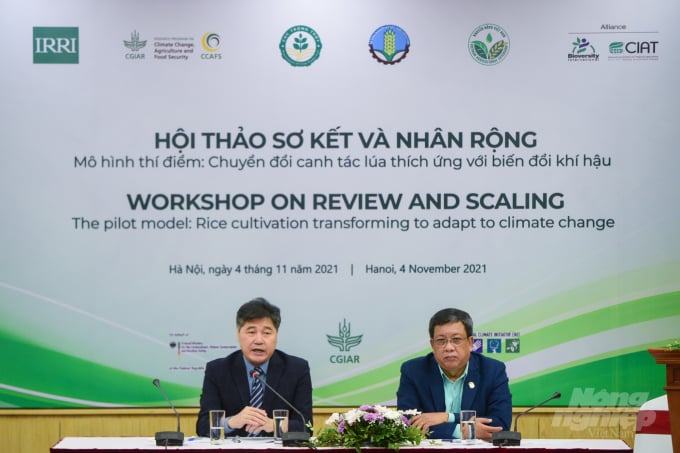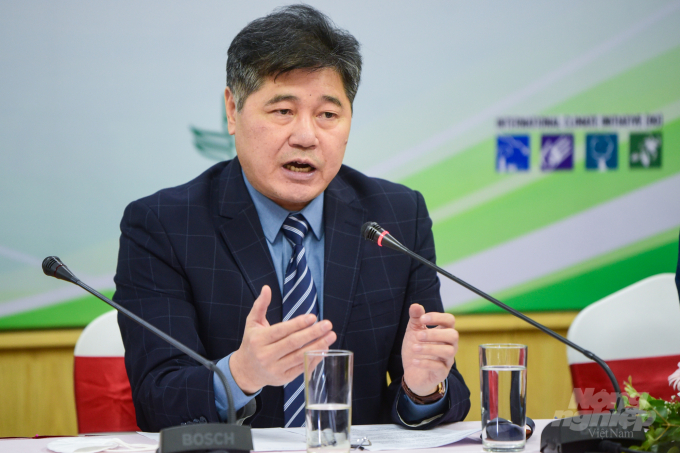November 27, 2025 | 20:50 GMT +7
November 27, 2025 | 20:50 GMT +7
Hotline: 0913.378.918
November 27, 2025 | 20:50 GMT +7
Hotline: 0913.378.918

The workshop on preliminary review and scaling of the model "rice cultivation transformation to adapt to climate change" was held on the morning of November 4. Photo: Tung Dinh.
The Department of Crops Production and the National Agricultural Extension Center (NAEC) creat a pilot model on Transforming Farming Systems Under Climate Change (TFCC) to determine future rice cultivation techniques in the face of climate change effects.
The CGIAR Research Program on Climate Change, Agriculture, and Food Security in Southeast Asia (CCAFS-SEA), the International Rice Research Institute (IRRI), and the DeRISK Southeast Asia Project Asia are collaborating on the project. The International Union for Biological Diversity and CIAT are also involved.
On November 4, stakeholders convened a workshop to examine the results of the one-year model and develop strategies for replicating it and implementing the project's recommendations.
According to NAEC Director Le Quoc Thanh, the initiative is a solution that brings together units of the Ministry of Agriculture and Rural Development and a number of foreign organizations and has resulted in very beneficial and practical impacts on production.
"This is a novel method that enables producers to be actively engaged in the planning process, visualizing strategies to address climate change while recognizing that its influence on output is not uniform. Exports in the Mekong Delta area are more robust and consistent," Mr. Le Quoc Thanh said.

Director of the National Center for Agriculture and Rural Development Le Quoc Thanh said this solution should be replicated in many localities in the Mekong Delta as well as in areas affected by climate change. Photo: Tung Dinh.
The Department of Crops Production and NAEC devised and presented during the workshop a roadmap for scaling up TFCC to additional agro-ecological zones in the Mekong Delta, with input from all stakeholders. The scale-up strategy will serve as a roadmap for local stakeholders in managing and implementing comparable initiatives.
Mr. Le Quoc Thanh said on the margins of a seminar on this subject that TFCC is a strategy that may be used in places impacted by climate change.
"We will encourage individuals to join more actively and to spread the word about the efficacy of this approach." A strategy has also been formed within the agricultural extension system to duplicate the TFCC outcomes in other provinces in the Mekong Delta and places at high risk of climate change effects," Mr. Le Quoc Thanh said.
Additionally, stakeholders generated risk maps and climate change adaptation plans (CS-MAPs) as well as local climate information services (at the commune level) during the workshop. Discuss the appropriateness and efficacy.
Adaptation plans designed for rice-producing areas include strategies for seed selection, agricultural practices, and harvesting schedules.
Additionally, a range of adaptation approaches, such as variety conversion, crop diversification, and land conversion to other crops, have been found. The collaborative production of the Agricultural Crop Bulletin (ACB) has been warmly accepted, particularly in light of recent improvements aimed at enhancing district and provincial stakeholder engagement and communication frequency.
On November 4, the session presented Technical Documents on CS-MAP development and a Local Agricultural Consultant. This article outlines the fundamental procedures necessary to conduct participatory risk mapping and adaptation planning at the local level. Additionally, the technical paper discusses in depth the process of developing and disseminating a Local Crop Advisory based on meteorological and climatic data.
Applying to the commune-level
The Climate Change Adaptation Planning and Risk Mapping (CS-MAP) strategy has been adopted down to the commune level to build the agricultural consultation, followed by the construction of agricultural newsletters (ACBs) appropriate for each locality's circumstances.
Participants in CS-MAP work together to identify climate-related risks using scientific evidence, local knowledge, and risk assessment; improve proposed adaptation measures; and develop integrated adaptation plans for rice production from regional to provincial levels.
Participatory agricultural suggestions are based on the CS MAP and crop planning and management advice based on weather and crop predictions.
The TFCC concept has been tested in three Mekong Delta communes: Hoa Chanh (U Minh Thuong district, Kien Giang province), An My (Ke Sach district, Soc Trang province) and Tan Phuoc (Go Cong Dong district - Tien Giang province).
Translated by Linh Linh

(VAN) According to Mr. Vo Minh Thanh, Director of the Tay Ninh Department of Agriculture and Environment, Resolution 57 has created a new development pathway for the locality, shifting from traditional toward modern agriculture.
/2025/11/26/4909-2-154329_878.jpg)
(VAN) Pearl grouper farming in HDPE cages not only delivers economic efficiency but also contributes to protecting the environment, creating jobs, and promoting marine-based experiential tourism.

(VAN) The model of making a living under the forest canopy through the agroforestry system in Van Son commune, Bac Ninh province, is expected to generate an annual income of approximately VND 30 million/ha.

(VAN) Many enterprises in Can Tho are harnessing natural energy and reducing greenhouse gas emissions in their production processes, thereby contributing to the promotion of a sustainable green transition.
/2025/11/24/3536-2-112800_176.jpg)
(VAN) Dong Nai now has tens of thousands of hectares of forests certified for sustainable management, and this area will continue to be expanded in the coming period.

(VAN) Vinh Ha hamlet (Dai Xuyen commune, Hanoi) is shifting away from small-scale farming as households adopt bioscurity into their breeder chicken models.

(VAN) Heavy rains make aquatic species more vulnerable to disease. Proactive water management and high-tech systems help farmers prevent outbreaks and protect yields.